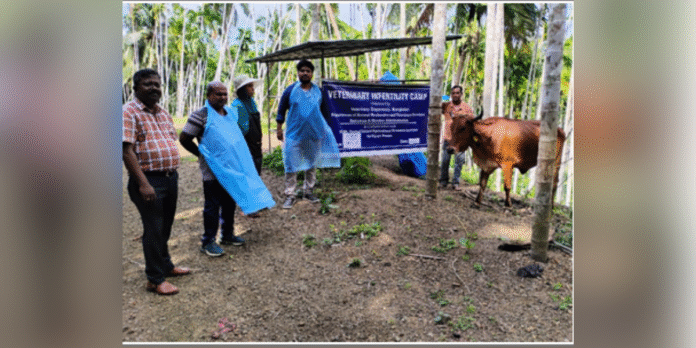In a focused effort to tackle infertility in cattle and support livestock-dependent livelihoods, the Department of Animal Husbandry and Veterinary Services (AH&VS), A&N Administration, in collaboration with the Central Island Agricultural Research Institute (CIARI), organised a Veterinary Health-cum-Infertility Camp on July 30 in the rural pockets of Wandoor and Humphreygunj. The initiative aimed to mitigate one of the leading causes of economic loss among dairy farmers, cattle infertility, through expert intervention and on-ground veterinary care.
The camp saw veterinary teams examining 165 cattle, of which 28 animals were specifically screened for infertility-related concerns. Ten animals received targeted treatment for reproductive disorders, as specialists identified root causes and prescribed remedial care. Alongside treatment, farmers were educated on practical steps to improve livestock fertility, including balanced feeding, better breeding practices, and routine health checks, crucial for improving milk production and herd sustainability.
Infertility in cattle has long been a persistent challenge for livestock owners in the islands, often leading to diminished productivity and financial strain. Officials at the camp highlighted the importance of addressing this issue through regular outreach programs that combine veterinary care with farmer education. Emphasis was laid on adopting integrated reproductive health management, with a clear message that nutrition and animal welfare are foundational to successful dairy farming.
The camp was attended by veterinary and agricultural experts, including Dr. Perumal P, Senior Scientist, ICAR-CIARI; Dr. Lawhale Ninad Sahebrao, Senior Veterinary Officer; Dr. Zachariah George, Subject Matter Specialist from Krishi Vigyan Kendra; and the team from the Veterinary Dispensary in Manglutan. Their joint presence ensured a multidisciplinary approach to animal healthcare, reinforcing the value of collaboration between scientific institutions and administrative departments.
Local participation was notably high, with farmers actively engaging in consultations and discussions with veterinary teams. Officials noted that such response reflects growing community awareness about the significance of reproductive health in livestock and the benefits of adopting scientific practices in animal husbandry.
The Department of Animal Husbandry has confirmed plans to continue organising similar camps across the islands, especially in underserved and rural areas. The goal, they said, is to ensure equitable access to veterinary services and to contribute to the A&N Administration’s larger vision of sustainable agriculture, rural development, and food security.
As livestock farming continues to be a crucial livelihood for many island residents, such field-level initiatives are expected to play a key role in boosting productivity, improving animal welfare, and empowering rural communities with knowledge and access to quality veterinary care.





